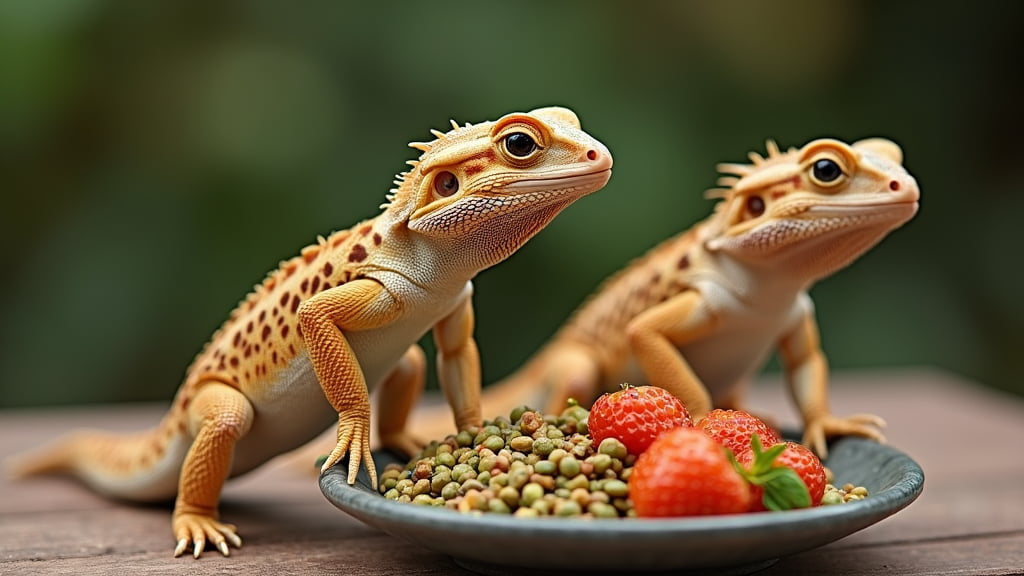If you’re a proud owner of a bearded dragon or considering becoming one, you might already know that their unique diet is one of the most crucial aspects of their care. Balancing nutrition for bearded dragons isn’t just about knowing what they can eat; it’s about understanding their dietary needs at different stages of their life. Let’s delve into how you can ensure your bearded dragon thrives with a balanced and nutritious diet.
Understanding Bearded Dragon Dietary Needs
Juvenile vs. Adult Diets
One of the first things to recognise is that juvenile and adult bearded dragons have significantly different dietary requirements. Juveniles need a protein-rich diet to support their rapid growth, while adults thrive on a diet that’s more heavily weighted towards vegetables.
Juvenile Dragons
Juvenile bearded dragons need approximately 70% insects and 30% vegetables. Protein is essential for their growth. I remember when I raised my first juvenile dragon, Spike. He had a voracious appetite and loved crickets and mealworms. However, it’s essential to ensure these insects are gut-loaded with nutrients before feeding them to your dragon.
Adult Dragons
As bearded dragons mature, their dietary needs shift towards a plant-based diet. Adult dragons typically require about 20% insects and 80% vegetables. When my dragon, Draco, transitioned to adulthood, I introduced a variety of leafy greens and vegetables. His favourites included collard greens and butternut squash.
Essential Components of a Bearded Dragon Diet
Protein Sources
High-quality protein is crucial, especially for younger dragons. Here are a few excellent sources:
- Insects: Crickets, mealworms, and dubia roaches are popular choices.
- Occasional Treats: Waxworms and superworms can be offered as occasional treats.
Ensure any insects are captive-bred to avoid the risk of parasites.
Vegetables and Greens
Leafy greens and fresh vegetables should form the bulk of an adult dragon’s diet. Some safe options include:
- Leafy Greens: Collard greens, mustard greens, and dandelion greens.
- Vegetables: Butternut squash, zucchini, and bell peppers.
Avoid feeding spinach and lettuce regularly as they can bind calcium, making it harder for your dragon to absorb this essential nutrient.
Fruits
Fruits should be given sparingly due to their high sugar content. Some safe options are:
- Berries: Strawberries and blueberries.
- Melons: Watermelon and cantaloupe.
Nutritional Supplements
Calcium and Vitamin D3
Without a proper balance of calcium and vitamin D3, bearded dragons can develop metabolic bone disease. I always dusted Draco’s food with a high-quality calcium powder at least 3 times a week and ensured he had adequate UVB lighting to synthesise vitamin D3.
Multivitamins
A multivitamin supplement once a week can help prevent any nutritional deficiencies. Just be mindful not to overdo it, as overdosing on vitamins can be harmful.
Common Feeding Mistakes
Overfeeding Insects
While it’s tempting to spoil your dragon with their favourite treats, overfeeding protein, especially to adults, can lead to obesity and other health issues. When I first started, I made the mistake of giving Spike too many mealworms, which led to excess weight.
Ignoring Hydration
Bearded dragons absorb most of their water through their food, but they should always have a shallow dish of fresh water available. I found that misting vegetables before feeding can also help with hydration.
Not Varying the Diet
A monotonous diet can lead to nutrient deficiencies. Rotate different greens, vegetables, and insects to ensure a well-rounded nutrient intake. Draco particularly appreciated the variety and was always more active when his diet included different types of food.
Conclusion
Balancing nutrition for bearded dragons is both an art and a science. By understanding their dietary needs at different life stages, providing a variety of food sources, and avoiding common feeding mistakes, you can ensure that your dragon leads a healthy, happy life. Always remember, for any specific health concerns, consult with a vet experienced with reptiles.
For more detailed guides on bearded dragon care, check out our Bearded Dragon Care section. And if you’re looking for quality supplies, this exotic pet shop has excellent options.
With the right knowledge and a little effort, keeping your bearded dragon healthy and well-fed can be an immensely rewarding experience. Happy feeding!
Meta Description: Learn how to balance nutrition for bearded dragons, from juveniles to adults, with practical advice and expert insights. Ensure your dragon thrives with a proper diet.

